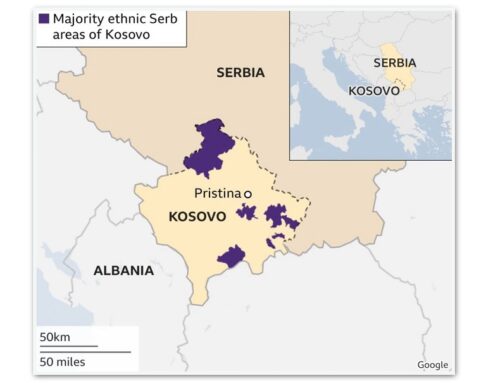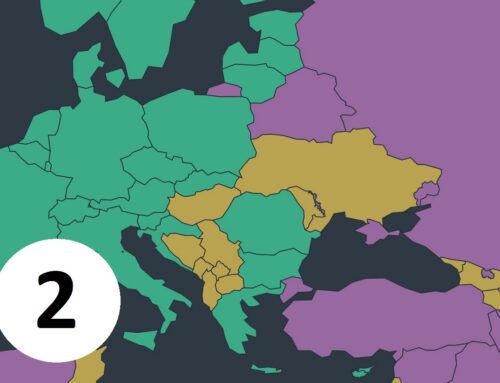The Balkan region has had a rich history, marked by political instability, ethnic conflict, and economic struggles. However, a new initiative firstly called the Mini-Schengen, and now known as the Open Balkan Initiative aims to change that. The initiative has generated both excitement and concern among policymakers and analysts. On the one hand, the project represents a new beginning for the Balkan region, with the potential to promote economic growth, regional integration, and political stability. On the other hand, some worry that Open Balkan could create new divisions in the European Union and undermine its efforts to promote unity and cooperation in the region.
The Open Balkan initiative originated in 2019 during a meeting in Novi Sad, Serbia, where the leaders of Serbia, Albania, and North Macedonia – President Aleksandar Vučić, Prime Minister Edi Rama, and Prime Minister Zoran Zaev, – agreed to establish an economic zone aimed at improving political, economic, and cultural ties between the three states. The name “Open Balkan” was officially introduced during the Economic Forum on Regional Cooperation in Skopje in June 2021, and the leaders of the three countries announced the initiative’s launch during a summit in Belgrade in October 2021.
The primary objective of the initiative is to enhance the economic, political, and cultural relations among the participating countries. Its ultimate goal is to establish a free trade zone and a unified market, which can be described as an EU-like market in Southeastern Europe, therefore we can see why, in some cases, it has been called Mini-EU, and how some analysts can see this as a threat towards the EU.
Although all three member countries of the Open Balkan initiative benefit economically, the benefits are not equal. Serbia appears to be the biggest beneficiary, due to its larger economic potential and higher exports in comparison to the other two member countries. Additionally, Serbia sees this initiative as an alternative to the EU membership, as negotiations for accession have been slow since 2014 due to various factors, including issues related to democratic governance, the rule of law, and most importantly Serbia’s issues with Kosovo, and relations with Russia. In addition, Serbia views the initiative as an opportunity to establish its leadership role in the region. For North Macedonia, the initiative is beneficial due to its geographic location, which creates a vital link between Serbia and Albania. And Albania, on the other hand, stands to benefit mainly from increased tourism.
The other countries of the Western Balkan – Montenegro, Bosnia and Herzegovina, and Kosovo – have not joined the Open Balkan initiative, although they have been invited to participate. Kosovo has not expressed an interest in joining due to its unresolved status and political instability, and its participation in any regional initiatives is closely linked to its relations with Serbia. As Kosovo’s independence is not recognized by Serbia, it faces obstacles in joining regional initiatives, including the Open Balkan initiative. Despite this, Montenegro and Bosnia and Herzegovina have been invited to participate but have yet to join the initiative due to concerns over maintaining neutrality, balancing relationships with the EU and neighboring countries, and potential divisions within the Balkan region.
In November 2022, the Open Balkan regional initiative faced criticism from Montenegro’s Ministry of European Affairs, which published an analysis questioning its lack of transparency and overreliance on the “charismatic leadership” of the participating countries. Besides that, both domestic and foreign analysts have also been scrutinizing the initiative, and it has faced significant criticism. One of them being from Joseph Edward, a Balkan analyst, who sees this initiative as dangerous, stating that it could lead to aggravating political problems in the region. He also emphasizes the importance of the EU’s involvement in promoting regional stability and cooperation, rather than initiatives that could exacerbate divisions in the Balkans.
Overall, the Open Balkan initiative still has the potential to contribute to the stability and development of the Balkan region, and it remains to be seen whether the rest of the Western Balkan countries will eventually join the initiative. While the initiative has the potential to promote economic growth, regional integration, and political stability, it could also create new divisions in the region and undermine the EU’s efforts to promote unity and cooperation. Therefore, the launch of Open Balkan represents both an opportunity and a challenge for the Balkan region and the European Union. As the project moves forward, policymakers will need to carefully consider these issues and work to ensure that Open Balkan remains a positive force for the region and for Europe as a whole.
Resource:
“Analiza prednosti i mane učešća Crne Gore u regionalnoj inicijativi ‘Otvoreni Balkan’” by Montenegro’s Ministry of European Affairs – Government of Montenegro – https://www.gov.me/clanak/analiza-prednosti-i-mane-ucesca-crne-gore-u-regionalnoj-inicijativi-otvoreni-balkan
“Open Balkan Initiative risks aggravating political problems in the region” by Deutsche Welle – https://www.dw.com/en/open-balkan-initiative-risks-aggravating-political-problems-in-the-region/a-62834261
“Zapadni Balkan: Inicijativa “Otvoreni Balkan” i uloga civilnog sektora” by Radio Free Europe/Radio Liberty – https://www.slobodnaevropa.org/a/crna-gora-zapadni-balkan-civilni-sektor-otvoreni-balkan/32100266.html
“Konferencija ‘Otvoreni Balkan’ u Banja Luci” by Radio Free Europe/Radio Liberty – https://www.slobodnaevropa.org/a/otvoreni-balkan-banja-luka-konferencija/32342270.html
“Inicijativa ‘Otvoreni Balkan’ u Crnoj Gori i Bosni i Hercegovini” by Gradski – https://gradski.me/inicijativa-otvoreni-balkan-crna-gora-i-bosna-i-hercegovina/
“Abazović: Inicijativa ‘Otvoreni Balkan’ potrebna regionu” by Danas – https://www.danas.rs/svet/region/abazovic-inicijativa-otvoreni-balkan-potrebna-regionu/
“Open Balkans Initiative Moves Forward with Signing of Six Agreements” by Central European Times – https://centraleuropeantimes.com/2021/12/open-balkans-initiative-moves-forward-with-signing-of-six-agreements/
“Çka është Ballkani i Hapur?” by Nacionale – https://nacionale.com/politike/cka-eshte-ballkani-i-hapur-7885
“Çfarë është Nisma ‘Ballkani i Hapur’” by Tirana Post – https://tiranapost.al/aktualitet/fare-eshte-nisma-ballkani-i-hapur-i508184


